Unit 1 Cultural Heritage Learning about language课件(共26张)
文档属性
| 名称 | Unit 1 Cultural Heritage Learning about language课件(共26张) |

|
|
| 格式 | pptx | ||
| 文件大小 | 339.2KB | ||
| 资源类型 | 教案 | ||
| 版本资源 | 人教版(2019) | ||
| 科目 | 英语 | ||
| 更新时间 | 2024-10-18 00:00:00 | ||
图片预览

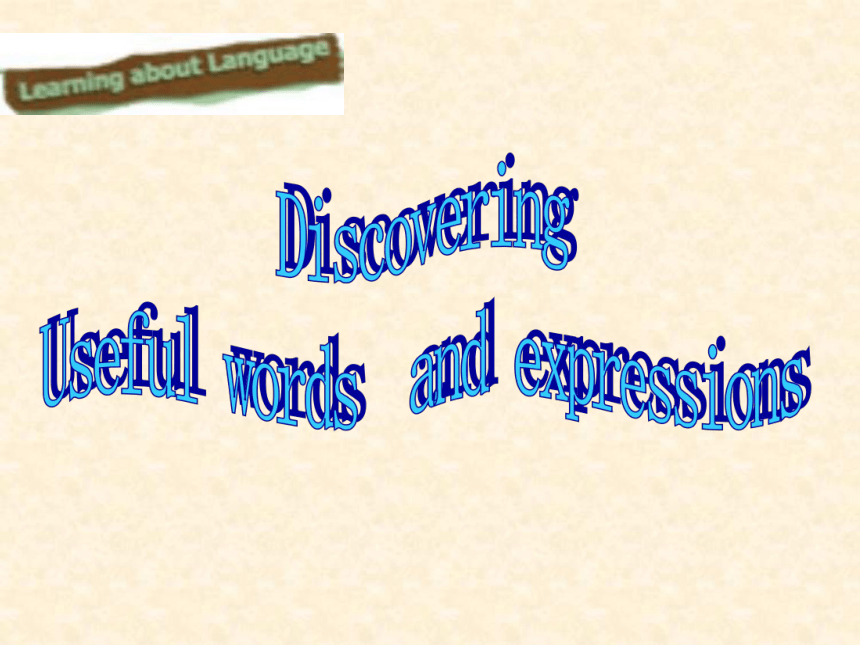
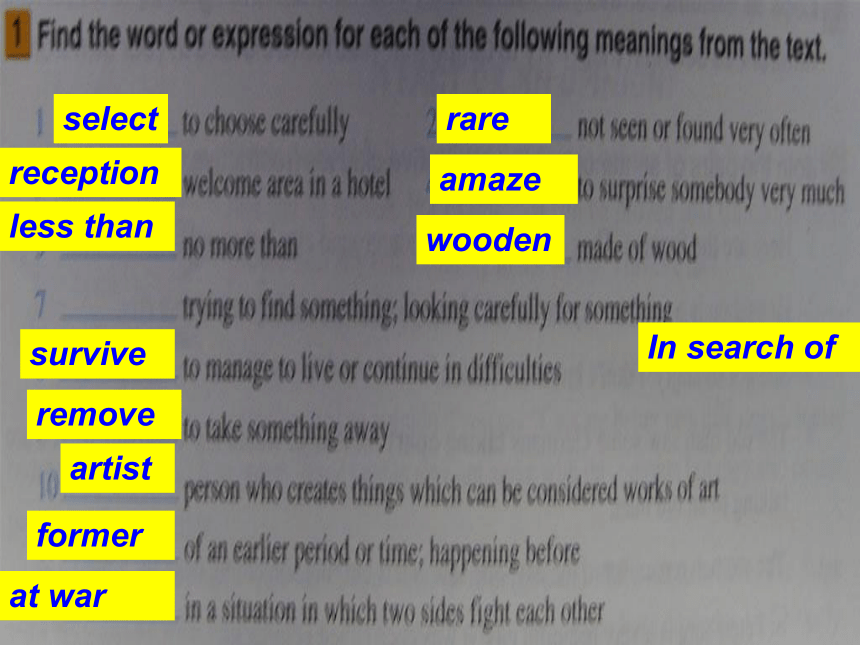
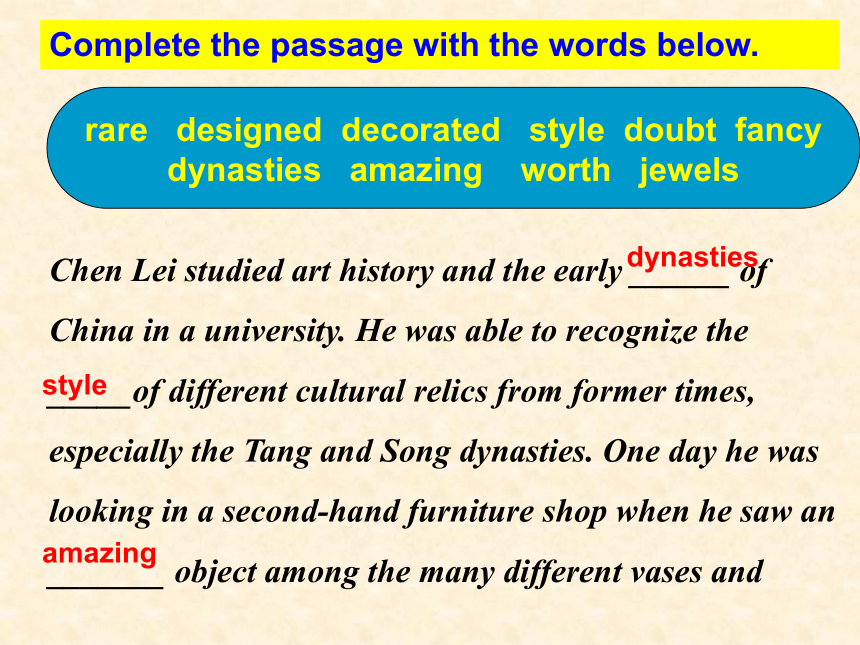
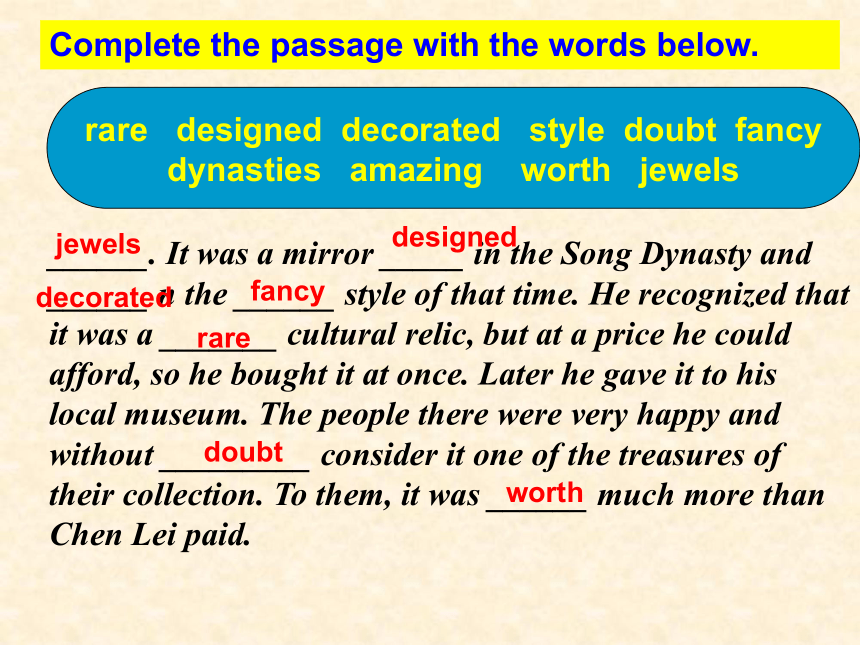
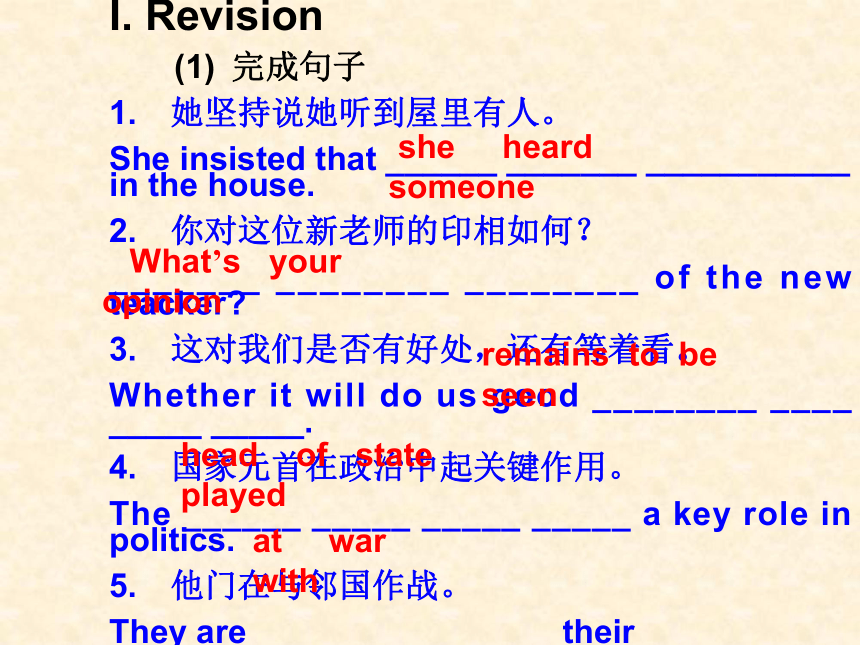
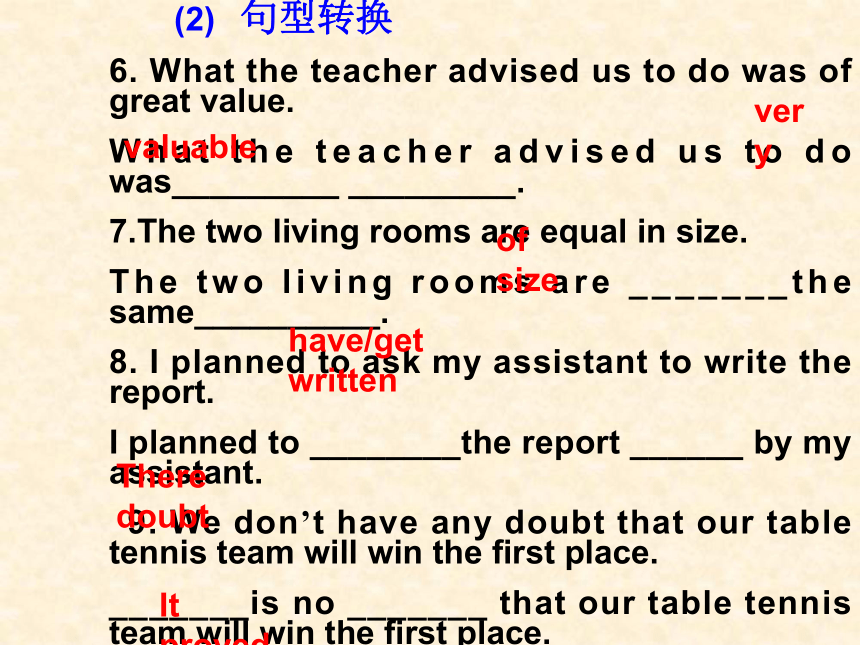
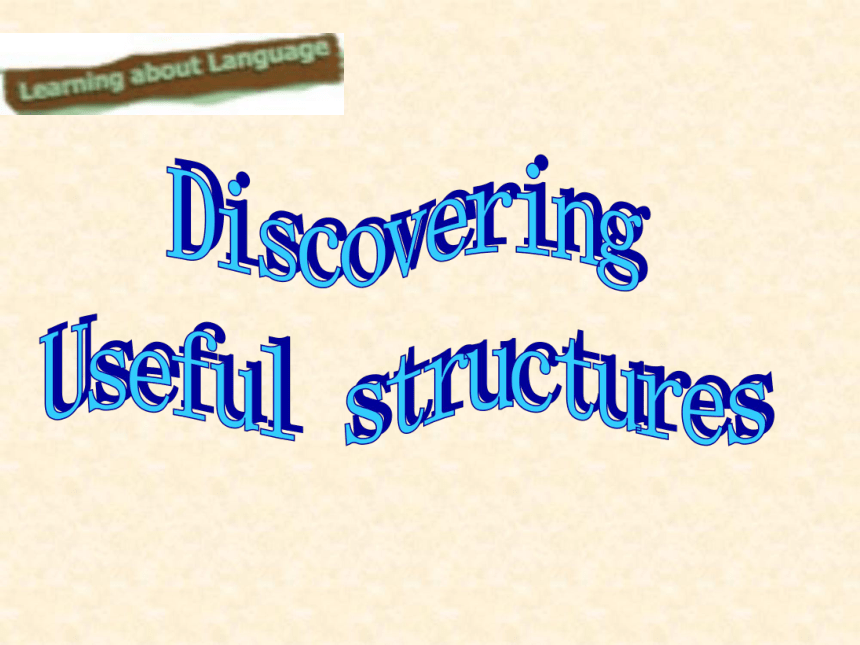
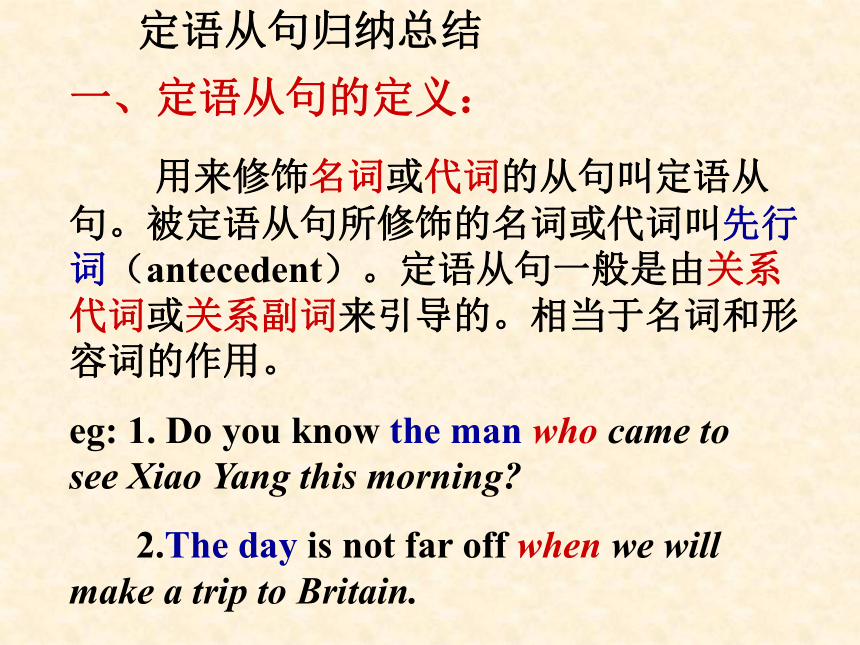
文档简介
(共26张PPT)
Unit 1 Cultural Relics
Discovering
Useful words and expressions
select
rare
reception
amaze
less than
wooden
In search of
survive
remove
artist
former
at war
Complete the passage with the words below.
rare designed decorated style doubt fancy
dynasties amazing worth jewels
Chen Lei studied art history and the early ______ of China in a university. He was able to recognize the _____of different cultural relics from former times, especially the Tang and Song dynasties. One day he was looking in a second-hand furniture shop when he saw an _______ object among the many different vases and
dynasties
style
amazing
Complete the passage with the words below.
rare designed decorated style doubt fancy
dynasties amazing worth jewels
______. It was a mirror _____ in the Song Dynasty and ______ n the ______ style of that time. He recognized that it was a _______ cultural relic, but at a price he could afford, so he bought it at once. Later he gave it to his local museum. The people there were very happy and without _________ consider it one of the treasures of their collection. To them, it was ______ much more than Chen Lei paid.
jewels
designed
decorated
fancy
rare
doubt
worth
I. Revision
(1) 完成句子
1. 她坚持说她听到屋里有人。
She insisted that ______ _______ ___________ in the house.
2. 你对这位新老师的印相如何?
_______ ________ ________ of the new teacker
3. 这对我们是否有好处,还有等着看。
Whether it will do us good ________ ____ _____ _____.
4. 国家元首在政治中起关键作用。
The ______ _____ _____ _____ a key role in politics.
5. 他门在与邻国作战。
They are _____ _____ _____ their neighbouring country.
she heard someone
What’s your opinion
remains to be seen
head of state played
at war with
(2) 句型转换
6. What the teacher advised us to do was of great value.
What the teacher advised us to do was_________ _________.
7.The two living rooms are equal in size.
The two living rooms are _______the same__________.
8. I planned to ask my assistant to write the report.
I planned to ________the report ______ by my assistant.
9. We don’t have any doubt that our table tennis team will win the first place.
_______is no _______ that our table tennis team will win the first place.
10. The theory proved to be true.
_______ can be ________that the theory was true.
very
valuable
of size
have/get written
There doubt
It proved
Discovering
Useful structures
一、定语从句的定义:
用来修饰名词或代词的从句叫定语从句。被定语从句所修饰的名词或代词叫先行词(antecedent)。定语从句一般是由关系代词或关系副词来引导的。相当于名词和形容词的作用。
eg: 1. Do you know the man who came to see Xiao Yang this morning
2.The day is not far off when we will make a trip to Britain.
定语从句归纳总结
二、关系代词和关系副词的作用:
1、引导作用
2、替代作用
3、在定语从句中担当某个成分的作用
eg: 1.Those who want to go please sign your names here.
2.This is the house where he was born.
3. Bill, who was here yesterday, asked me a lot of questions.
三、关系代词(who, whom, which, that, whose)的指代关系
指人 指物 在定语从句中的作用 Who
Whom Which
that
whose √
√
√
√
√
√
√
主语 宾语
宾语
主语 宾语
主语 宾语
定语
Eg:1.He is such a man who never tells a lie.
2. He is the model worker whom/who we should learn from.
3. A dictionary is a book which often helps us to know the meanings of the words.
4. This is the film which I like best.
5. The boy whose father is a professor is one of my best friends.
6. The house whose roof was blown away by the storm will be rebuilt soon.
四、关系代词which和that的区别:
A.关系代词必须用that的情形:
1、当先行词被形容词的最高级所修饰
This is the best film that I have ever seen.
2、当先行词被序数词修饰
The first car that arrived at the destination was driven by John.
3、当先行词被the only, the very等修饰
This is the only ticket that I got yesterday.
This is the very book that I’m looking for.
4、当先行词为不定代词时或被不定代词修饰时
Is there anything that I can do for you
All that you have to do is to press the button.
There is no time that we can waste.
5、当先行词既指人又指物时
The car and its driver that knocked down the old lady have been taken to the police station.
B.指物时,作介词的宾语,关系代词只能用which
This is the question about which we’ve had so much discussion.
五、关系副词when, where, why的用法
关系副词都等于一个适当的介词+which,在从句中作状语
When=in/at/on/…+which;
Where=in/at/on/…+which;
Why=for /…+which
1.Do you still remember the day when(on which) we went to visit the museum together
2.This is the factory where(in which)my father once worked.
3.This is the reason why(for which) he was late.
六、as引导定语从句,多与such和the same连用,在从句中作主语或宾语。
1.Such people as you describe are rare nowadays.
2.Let’s discuss only such questions as concern every one of us.
3.Would you please buy me the same novel as you bought for brother yesterday, Mum
4. As we all know, John is an honest man.
比较:
She wore the same dress that she wore at Mary’s wedding.
七、注意事项:
1、关系代词和关系副词在定从中的不同成分
a、This is the place where he works.
This is the place which(that)we visited last year.
b、That was the time when he arrived.
Do you still remember the days that (which)we spent together
c、This is the reason why he went.
The reason that (which)he gave us was quite reasonable.
2、关系代词放在介词后面,只能用which或whom
a. This is the boy with whom he worked.
b. This is the boy whomhe worked with.
c. This is the boy who he worked with.
d. This is the boy he worked with.
e. The house where we live is not large.
f. The house in which we live is not large.
g. The house which we live in is not large.
h. The house we live in is not large.
八、限制性定语从句和非限制性定语从句
1.限制性定语从句是先行词在意义上不可缺少的定语,如果去掉,主句的意思就不完整或失去意义。这种从句和主句的关系十分密切,写时不用逗号分开。限制性定语从句中作宾语的关系代词常可省略。
如:
a) What is the name of the tall woman who is standing there
站在那边的那个女人叫什么名字
b) Toronto is a city (that) I' ve always wanted to visit.
多伦多是我常想去参观的一个城市。
c) The woman ( that/ whom/ who ) I spoke to just now is our new head.
刚才和她说话的那位是我们新来的负责人。
d)October 1, 1949 was the day when the People's Republic of China was founded.
1949年10月1日是中华人民共和国成立的日子。
2.非限制性定语从句和主句关系不十分密切,只是对先行词作些附加的说明, 如果去掉, 主句的意思仍然清楚。这种从句和主句之间往往用逗号分开,一般不用that引导。非限制性定语从句中,关系词不可省略。如:
a) Rome, which is the capital of Italy, has a very long history.
意大利的首都罗马历史非常悠久。
b) Yesterday I met Professor King, who came from the University of London.
昨天我遇见金教授,他从伦敦大学来的。
c) He lent me a dictionary, which was just what I needed.
他借给我一本词典,这正是我所需要的。
3.大多数限制性和非限制性定语从句的先行词往往为某一个词或短语,而特殊场合非限制性定语从句的先行词也可为整个主句,此时非限制性定语从句常由which引导。
eg. A middle-aged woman killed her husband, which frightened me very much.
一个中年女子杀害了其丈夫,这事令我十分恐惧。
析:从语境可知,令我恐惧的内容应为中年女子杀害了其丈夫这整个一件事,因此先行词为整个主句,此时应由which引导定语从句。
e.g. A five-year-old boy can speak two foreign languages, which surprises all the people present.
一个五岁的男孩会讲两门外语,令所有在场的人感到非常惊讶。
析:从语境可知,令所有在场的人感到惊讶的内容是一个五岁男孩会讲两门外语这整个一件事,因此先行词为整个主句,此时应由which引导非限制性定语从句。
4.关系代词whom在限制性定语从句中作宾语时可用who代替whom,但在非限制性定语从句中作宾语时不可用who来代替。
eg. This is the girl whom I met in the street.
这是我在街上遇到的女孩。
先行词the girl在限制性定语从句中作宾语,可用who代替whom。
eg. A young man had a new girl friend, whom he wanted to impress.
一个年轻的小伙子新交了一个女朋友,他想给她留下深刻印象。
先行词a new girl friend在非限制性定语从句中作宾语,不可用who代替whom。
5. 比较:
a) She has two brothers who are working in the city.
She has more than two brothers.
她有两个弟弟在这个城市工作。
b) She has two brothers, who are working in the city.
She has only two brothers.
她有两个弟弟,他们在这个城市工作。
下面两个句子只有一个逗号之差,意义大相径庭。
a) He will wear no clothes which will make him different from others.
他不会穿一些使他显得与众不同的衣服。
b) He will wear no clothes, which will make him different from others.
他不穿衣服,这会使他显得与众不同。
Unit 1 Cultural Relics
Discovering
Useful words and expressions
select
rare
reception
amaze
less than
wooden
In search of
survive
remove
artist
former
at war
Complete the passage with the words below.
rare designed decorated style doubt fancy
dynasties amazing worth jewels
Chen Lei studied art history and the early ______ of China in a university. He was able to recognize the _____of different cultural relics from former times, especially the Tang and Song dynasties. One day he was looking in a second-hand furniture shop when he saw an _______ object among the many different vases and
dynasties
style
amazing
Complete the passage with the words below.
rare designed decorated style doubt fancy
dynasties amazing worth jewels
______. It was a mirror _____ in the Song Dynasty and ______ n the ______ style of that time. He recognized that it was a _______ cultural relic, but at a price he could afford, so he bought it at once. Later he gave it to his local museum. The people there were very happy and without _________ consider it one of the treasures of their collection. To them, it was ______ much more than Chen Lei paid.
jewels
designed
decorated
fancy
rare
doubt
worth
I. Revision
(1) 完成句子
1. 她坚持说她听到屋里有人。
She insisted that ______ _______ ___________ in the house.
2. 你对这位新老师的印相如何?
_______ ________ ________ of the new teacker
3. 这对我们是否有好处,还有等着看。
Whether it will do us good ________ ____ _____ _____.
4. 国家元首在政治中起关键作用。
The ______ _____ _____ _____ a key role in politics.
5. 他门在与邻国作战。
They are _____ _____ _____ their neighbouring country.
she heard someone
What’s your opinion
remains to be seen
head of state played
at war with
(2) 句型转换
6. What the teacher advised us to do was of great value.
What the teacher advised us to do was_________ _________.
7.The two living rooms are equal in size.
The two living rooms are _______the same__________.
8. I planned to ask my assistant to write the report.
I planned to ________the report ______ by my assistant.
9. We don’t have any doubt that our table tennis team will win the first place.
_______is no _______ that our table tennis team will win the first place.
10. The theory proved to be true.
_______ can be ________that the theory was true.
very
valuable
of size
have/get written
There doubt
It proved
Discovering
Useful structures
一、定语从句的定义:
用来修饰名词或代词的从句叫定语从句。被定语从句所修饰的名词或代词叫先行词(antecedent)。定语从句一般是由关系代词或关系副词来引导的。相当于名词和形容词的作用。
eg: 1. Do you know the man who came to see Xiao Yang this morning
2.The day is not far off when we will make a trip to Britain.
定语从句归纳总结
二、关系代词和关系副词的作用:
1、引导作用
2、替代作用
3、在定语从句中担当某个成分的作用
eg: 1.Those who want to go please sign your names here.
2.This is the house where he was born.
3. Bill, who was here yesterday, asked me a lot of questions.
三、关系代词(who, whom, which, that, whose)的指代关系
指人 指物 在定语从句中的作用 Who
Whom Which
that
whose √
√
√
√
√
√
√
主语 宾语
宾语
主语 宾语
主语 宾语
定语
Eg:1.He is such a man who never tells a lie.
2. He is the model worker whom/who we should learn from.
3. A dictionary is a book which often helps us to know the meanings of the words.
4. This is the film which I like best.
5. The boy whose father is a professor is one of my best friends.
6. The house whose roof was blown away by the storm will be rebuilt soon.
四、关系代词which和that的区别:
A.关系代词必须用that的情形:
1、当先行词被形容词的最高级所修饰
This is the best film that I have ever seen.
2、当先行词被序数词修饰
The first car that arrived at the destination was driven by John.
3、当先行词被the only, the very等修饰
This is the only ticket that I got yesterday.
This is the very book that I’m looking for.
4、当先行词为不定代词时或被不定代词修饰时
Is there anything that I can do for you
All that you have to do is to press the button.
There is no time that we can waste.
5、当先行词既指人又指物时
The car and its driver that knocked down the old lady have been taken to the police station.
B.指物时,作介词的宾语,关系代词只能用which
This is the question about which we’ve had so much discussion.
五、关系副词when, where, why的用法
关系副词都等于一个适当的介词+which,在从句中作状语
When=in/at/on/…+which;
Where=in/at/on/…+which;
Why=for /…+which
1.Do you still remember the day when(on which) we went to visit the museum together
2.This is the factory where(in which)my father once worked.
3.This is the reason why(for which) he was late.
六、as引导定语从句,多与such和the same连用,在从句中作主语或宾语。
1.Such people as you describe are rare nowadays.
2.Let’s discuss only such questions as concern every one of us.
3.Would you please buy me the same novel as you bought for brother yesterday, Mum
4. As we all know, John is an honest man.
比较:
She wore the same dress that she wore at Mary’s wedding.
七、注意事项:
1、关系代词和关系副词在定从中的不同成分
a、This is the place where he works.
This is the place which(that)we visited last year.
b、That was the time when he arrived.
Do you still remember the days that (which)we spent together
c、This is the reason why he went.
The reason that (which)he gave us was quite reasonable.
2、关系代词放在介词后面,只能用which或whom
a. This is the boy with whom he worked.
b. This is the boy whomhe worked with.
c. This is the boy who he worked with.
d. This is the boy he worked with.
e. The house where we live is not large.
f. The house in which we live is not large.
g. The house which we live in is not large.
h. The house we live in is not large.
八、限制性定语从句和非限制性定语从句
1.限制性定语从句是先行词在意义上不可缺少的定语,如果去掉,主句的意思就不完整或失去意义。这种从句和主句的关系十分密切,写时不用逗号分开。限制性定语从句中作宾语的关系代词常可省略。
如:
a) What is the name of the tall woman who is standing there
站在那边的那个女人叫什么名字
b) Toronto is a city (that) I' ve always wanted to visit.
多伦多是我常想去参观的一个城市。
c) The woman ( that/ whom/ who ) I spoke to just now is our new head.
刚才和她说话的那位是我们新来的负责人。
d)October 1, 1949 was the day when the People's Republic of China was founded.
1949年10月1日是中华人民共和国成立的日子。
2.非限制性定语从句和主句关系不十分密切,只是对先行词作些附加的说明, 如果去掉, 主句的意思仍然清楚。这种从句和主句之间往往用逗号分开,一般不用that引导。非限制性定语从句中,关系词不可省略。如:
a) Rome, which is the capital of Italy, has a very long history.
意大利的首都罗马历史非常悠久。
b) Yesterday I met Professor King, who came from the University of London.
昨天我遇见金教授,他从伦敦大学来的。
c) He lent me a dictionary, which was just what I needed.
他借给我一本词典,这正是我所需要的。
3.大多数限制性和非限制性定语从句的先行词往往为某一个词或短语,而特殊场合非限制性定语从句的先行词也可为整个主句,此时非限制性定语从句常由which引导。
eg. A middle-aged woman killed her husband, which frightened me very much.
一个中年女子杀害了其丈夫,这事令我十分恐惧。
析:从语境可知,令我恐惧的内容应为中年女子杀害了其丈夫这整个一件事,因此先行词为整个主句,此时应由which引导定语从句。
e.g. A five-year-old boy can speak two foreign languages, which surprises all the people present.
一个五岁的男孩会讲两门外语,令所有在场的人感到非常惊讶。
析:从语境可知,令所有在场的人感到惊讶的内容是一个五岁男孩会讲两门外语这整个一件事,因此先行词为整个主句,此时应由which引导非限制性定语从句。
4.关系代词whom在限制性定语从句中作宾语时可用who代替whom,但在非限制性定语从句中作宾语时不可用who来代替。
eg. This is the girl whom I met in the street.
这是我在街上遇到的女孩。
先行词the girl在限制性定语从句中作宾语,可用who代替whom。
eg. A young man had a new girl friend, whom he wanted to impress.
一个年轻的小伙子新交了一个女朋友,他想给她留下深刻印象。
先行词a new girl friend在非限制性定语从句中作宾语,不可用who代替whom。
5. 比较:
a) She has two brothers who are working in the city.
She has more than two brothers.
她有两个弟弟在这个城市工作。
b) She has two brothers, who are working in the city.
She has only two brothers.
她有两个弟弟,他们在这个城市工作。
下面两个句子只有一个逗号之差,意义大相径庭。
a) He will wear no clothes which will make him different from others.
他不会穿一些使他显得与众不同的衣服。
b) He will wear no clothes, which will make him different from others.
他不穿衣服,这会使他显得与众不同。
